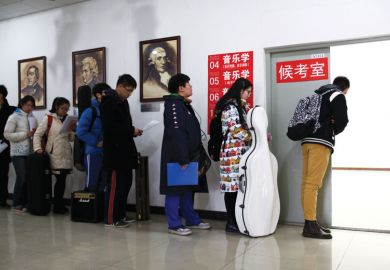Official guidelines on how UK universities must operate when working overseas cover a myriad of legal, financial and academic matters. Considering the ethics of working in a particular territory is not, however, required.
Without the need for an ethical review under existing Quality Assurance Agency rules, due diligence processes have been skewed. They mostly concern how to minimise the financial and reputation risk of working with partners – in particular, for-profit partners – who may have different motivations.
Of course, questions do arise about the ethics and risks of working in a specific market. But they are seldom encouraged or subjected to university-wide debate. Best not to ask the difficult questions aloud; don’t open the can of worms.
But a properly conducted ethical review, led by the senior member of staff responsible for internationalisation and which consults widely, strengthens an institution’s internationalisation agenda. Such a review reinforces a university’s sense of itself and its place in the world.
It should be the foundation that has to be laid before anything else is developed.
This is not easy and will raise uncomfortable questions that have no simple answer nor obvious conclusion. But asking and answering difficult questions is the role of a university.
Teaching overseas has risks. Many Western governments have developed guidelines to assist universities in reducing these risks. These tend to reflect their government’s ambiguous attitude towards their sector’s internationalisation efforts. Most are focused squarely on research too: Australia’s guidelines focus on the need to “counter foreign interference in the Australian education sector”, while Universities UK’s guidelines concern managing “security-related risks” regarding the potential theft of research and intellectual property.
However, most other European guidelines take as a starting point the idea that change for the better comes from engagement in education rather than from a denial of education. As stated in the Swedish guidelines: “International academic collaboration raises research and teaching quality, increases knowledge and understanding, and contributes to relationship- and trust-building.”
In recent times, arguments have arisen about whether exporting Western education is just another form of cultural imperialism. But while ethical reviews should shun ethnocentrism and not use one’s own culture or ethnicity as a frame of reference to judge other cultures, there cannot just be a blind acceptance of all difference. An overriding consideration must be whether engagement conforms to the university’s own core values and mission.
So one can accept that Chinese scholars, brought up in a Confucian society, are more likely to be comfortable with restricted academic freedom, but that any teaching done by one’s own staff in China must not be restricted.
Even the issue of human rights abuses is not straightforward. In July 2019, the UK was among only 22 signatories – all non-Muslim countries – of a joint letter to the UN Human Rights Council that condemned the Chinese government’s treatment of the Uyghurs. At the same time, a rival group of 54 countries praised China’s actions – many of these were Muslim countries. And even though the UK signed the letter, it didn’t do much else.
Although some will argue that overseas universities can – and have – been a progressive force for good in repressive regimes, universities should always consider whether their presence in a country will be interpreted as support for alleged abuses or whether their presence will support reforms in human rights.
In other areas, a number of tools and rankings can be used to help form debate. For example, the Freedom of Thought ranking is an index developed by Humanists International and examines four themes (constitution and government; education and children’s rights; society, community, family and religious courts and tribunals; and freedom of expression and advocacy of humanist values). However, this ranking is based on a humanist perspective: countries are low ranked if they have state-sponsored religion and laws against blasphemy. So the UK sits at the bottom half of the rankings at 132 out of 192. It might not be hugely helpful, but it is interesting to see how others view us from a different cultural perspective.
The Corruption Perceptions Index, developed by Transparency International, conducts worldwide surveys and ranks countries according to the perception of corruption of public bodies. But each university must make its own decision on whether they should work in corrupt regimes rather than outsource their opinions to other bodies.
Most recently, the Australian Strategic Policy Institute has developed a database of universities in China that are conducting research on behalf of the Chinese military. They claim that collaborating with these universities could lead to collaboration in research that could be used by the military for surveillance, human rights abuses or military purposes.
While the ASPI database may be useful, one should be wary. The ASPI declares openly that it receives funding from the Australian Department of Defence, as well as from the US, Japanese and UK governments and several large Western defence contractors, all whom have an interest in reducing universities’ research partnerships with their rival China.
Many questions should be answered before a university increases its engagement overseas. It is not enough to say that others are already working there or that one’s own government encourages it. That approach has proved unwise in the past as the political winds have shifted against regimes once considered friends, not foes.
Each university must satisfy itself that it has transparent processes that proactively identify realms of possibility without jeopardising the institution’s own values and standards. Only then can it explain why it has chosen to work in difficult places. And you need to start by asking the questions aloud.
Peter Brady is director of the independent higher education consultancy J & P Brady.
Register to continue
Why register?
- Registration is free and only takes a moment
- Once registered, you can read 3 articles a month
- Sign up for our newsletter
Subscribe
Or subscribe for unlimited access to:
- Unlimited access to news, views, insights & reviews
- Digital editions
- Digital access to THE’s university and college rankings analysis
Already registered or a current subscriber?








